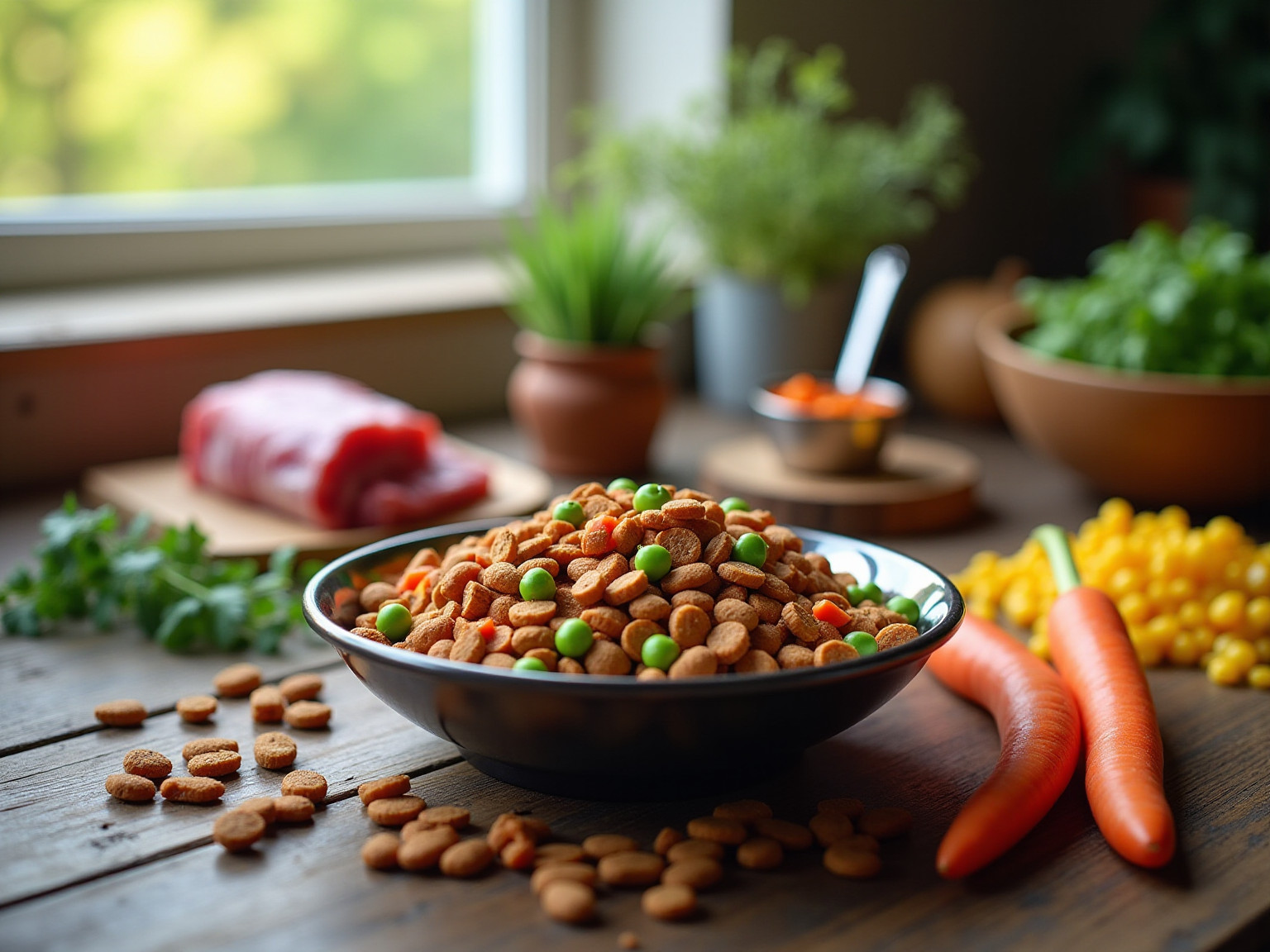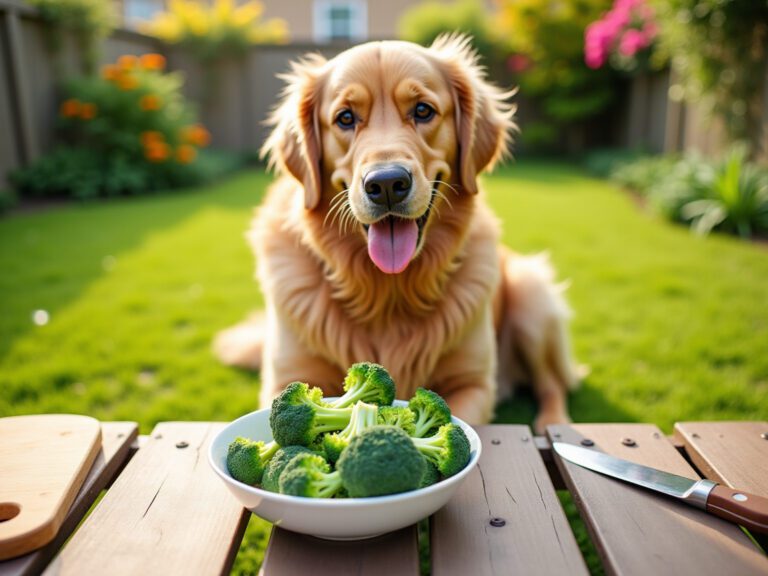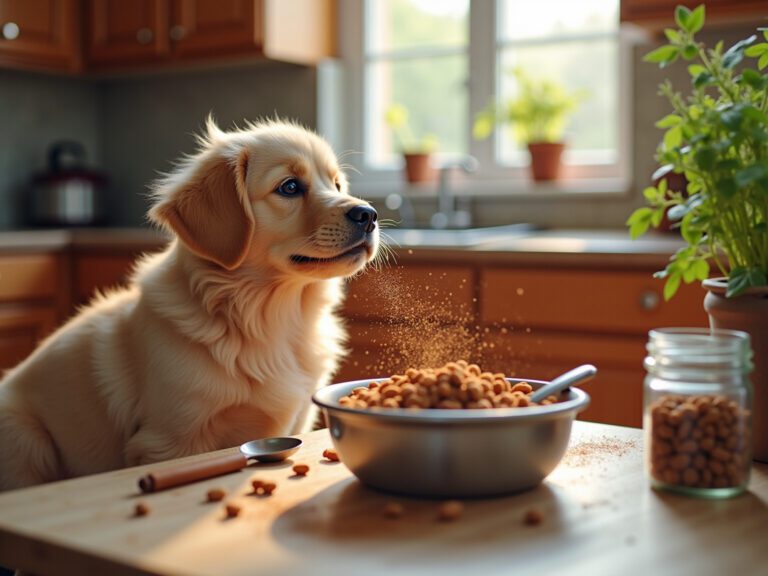Can Dogs Have Corn? Assessing Safety and Nutritional Value
Overview
As a loving pet owner, you may wonder if your furry family members can enjoy corn as a treat. The good news is that dogs can safely have corn when prepared correctly—specifically, off the cob and in moderation. This is not just a tasty snack; corn offers nutritional benefits, including:
- Energy
- Essential fatty acids
- Fiber
However, it’s important to keep a watchful eye for any adverse reactions, as most dogs do not have allergies to maize. By being mindful and offering corn responsibly, you can treat your beloved pets while ensuring their well-being.
Introduction
In the journey toward optimal health for your furry family members, understanding dog nutrition is essential. With a foundation built on six vital nutrients—proteins, fats, carbohydrates, vitamins, and minerals—alongside the often-overlooked significance of water, pet owners can feel empowered to make informed dietary choices. This article explores the nuances of dog nutrition, highlighting the roles these nutrients play in sustaining a dog’s vitality and well-being.
As we delve into various dietary components, corn stands out as a topic worth examining, prompting us to consider its safety, nutritional value, and potential risks. By navigating the complexities of dog nutrition together, you can ensure your beloved companions thrive on balanced and healthful diets.
Explore the Basics of Dog Nutrition
Understanding dog nutrition is essential for every pet owner who wants to provide the best for their furry family members. It is anchored in six vital nutrients: proteins, fats, carbohydrates, vitamins, and minerals, along with water. Each nutrient plays a critical role in maintaining your dog’s health and well-being:
- Proteins: Vital for growth, repair, and overall health, proteins supply amino acids necessary for various bodily functions. A diet rich in quality animal protein is regarded as the best option for canines, as it supports their immune system and overall vitality. As Lew Olson states, “Quality animal protein is the single best food you can feed your dog.”
- Fats: These are crucial for energy and the absorption of fat-soluble vitamins. Healthy fats also aid in skin and coat health, ensuring your dog maintains a shiny and vibrant appearance.
- Carbohydrates: Serving as a primary energy source, carbohydrates also aid digestion through dietary fiber, promoting a healthy gut. Importantly, a meal plan lacking added carbohydrates will typically possess increased protein and fat levels, which can be advantageous for specific dogs.
- Vitamins and Minerals: These nutrients are essential for numerous biochemical processes, including immune function, bone health, and overall metabolic processes. A balanced intake of vitamins and minerals is necessary to prevent deficiencies that can lead to health issues.
- Water: Frequently undervalued, water is crucial for hydration and sustains all bodily functions, making it an essential element of any dog’s nutrition.
By grasping these nutritional basics, you can evaluate the worth of particular items, like corn, and also understand if can dogs have corn in their diet for a balanced meal plan. For instance, fresh raw or cooked meals that are easily digestible can help prevent serious health problems, while including nutrient-rich choices like sea vegetables can improve overall nutrient absorption. A case study on the digestibility of sea vegetables for canines highlights their benefits, showing that they can be an ideal food source due to their nutrient profile. Current statistics indicate that subclinical protein deficiencies can increase a dog’s susceptibility to infections, underscoring the importance of a well-rounded diet. By concentrating on these six vital nutrients, you can ensure your beloved pets receive the complete nutrition they require for a healthy and active life.
Assess the Safety of Corn for Dogs
When prepared correctly, corn can be a safe and enjoyable treat for your furry family members, but important safety considerations arise, particularly regarding the question of can dogs have corn, as it is crucial to serve it off the cob to prevent choking hazards. Always prioritize safety because the cob can lead to serious intestinal blockages if ingested; this raises the question, can dogs have corn, and if so, moderation is key, treating corn as an occasional treat rather than a dietary staple. Feeding excessive amounts can lead to weight gain and digestive issues, so moderation is essential for your pet’s well-being, particularly when considering the question of can dogs have corn. It’s important to watch for signs such as itching, gastrointestinal upset, or skin irritations after introducing maize into their diet. Notably, research indicates that no dogs in a reviewed study were found to be allergic to maize, suggesting that can dogs have corn as a safe option for most. Although consumer perceptions often consider maize as an allergen, studies show that most dietary allergies in dogs stem from animal proteins rather than maize, raising the question of can dogs have corn, as many veterinarians agree that maize can be a beneficial part of a dog’s nutrition, especially considering its role in commercial pet products. A case study on maize co-products in pet food highlights their quality protein and fibrous components, which positively contribute to overall nutrition. Furthermore, canines fed NG-DDGS exhibited reduced digestibility for dry matter, organic matter, crude fat, crude fiber, and gross energy compared to those fed soybean meal or gluten meal from maize. This underscores the importance of choosing the right ingredients for your dog’s diet.
- Safety Guidelines: To safely incorporate maize into your dog’s meals, avoid serving it on the cob and ensure it’s given in moderation. This aligns with current veterinary guidance and reinforces the understanding that most allergies in dogs arise from animal proteins instead of maize.
By following these caring guidelines, you can confidently add maize to your dog’s meals, ensuring both safety and enjoyment for your beloved pet.
Evaluate the Nutritional Value and Risks of Corn
Corn offers a variety of nutritional benefits for your furry family members, making it a valuable addition to their diet when used appropriately:
- Energy Source: As a carbohydrate-rich food, corn provides essential energy for active dogs, supporting their energetic lifestyles.
- Essential Fatty Acids: Corn is a source of linoleic acid, an omega-6 fatty acid crucial for maintaining healthy skin and a shiny coat.
- Fiber: This grain contributes dietary fiber, which is important for digestion and helps promote regular bowel movements.
- Vitamins and Antioxidants: Corn is abundant in B vitamins and antioxidants like beta-carotene, which play a vital role in supporting overall health and immune function.
However, it’s important to consider the potential risks:
- Weight Gain: The carbohydrate content in corn can lead to weight gain if fed in excess, particularly in less active dogs.
- Digestive Problems: Some canines may experience gas or bloating when introduced to high-fiber foods such as maize, especially if they are not accustomed to it.
- Allergic Reactions: Although uncommon, some canines may have sensitivities or allergies to maize, necessitating careful observation when introducing it into their food. According to the Clinical Nutrition Team at Tufts University, less than one percent of dogs may have sensitivity to maize, highlighting its rarity.
Research indicates that maize can be a healthy element of a dog’s diet when provided in moderation. A case study titled “Is it Okay if My Dog’s Food Contains Corn?” assesses the incorporation of maize in canine diets, confirming its suitability because of its energy-giving attributes and vital nutrients. Veterinary insights indicate that although food allergies in pets are infrequent, sensitivities to maize are even less common, impacting fewer than one percent of dogs. Additionally, pet owners should be cautious of unpopped popcorn kernels, which can pose a choking hazard or get stuck in a dog’s teeth. Therefore, when considering maize as part of your dog’s nutrition, it is essential to balance its benefits with potential risks, ensuring a well-rounded diet tailored to the individual needs of each pet. Purina also believes in the power of grains, including corn, for pet nutrition.
Conclusion
Understanding dog nutrition is vital for ensuring the health and well-being of your furry family members. The six essential nutrients—proteins, fats, carbohydrates, vitamins, minerals, and water—serve unique and crucial functions in a dog’s diet.
- Proteins support growth and immune function.
- Fats provide energy and promote skin health.
- Carbohydrates, although sometimes debated, can aid digestion and serve as a significant energy source.
- Vitamins and minerals are indispensable for various bodily processes.
- Water is essential for hydration and overall health.
Exploring corn as a dietary component reveals potential benefits and considerations that every pet owner should know. When safely prepared and offered in moderation, corn can be a nutritious addition, providing energy, essential fatty acids, and dietary fiber. However, it’s important to remain vigilant about the risks associated with corn, including the possibility of weight gain and digestive issues, as well as rare allergic reactions. Following safety guidelines and being attuned to your dog’s unique dietary needs can help incorporate corn effectively.
Ultimately, making informed decisions about dog nutrition empowers you to foster healthier lifestyles for your beloved companions. By focusing on balanced diets and understanding the roles of various nutrients—including the safe inclusion of corn—you can enhance your pets’ vitality and longevity. This commitment to nutrition is a crucial step in nurturing a happy and active life for your cherished dogs.
Frequently Asked Questions
What are the six vital nutrients essential for dog nutrition?
The six vital nutrients essential for dog nutrition are proteins, fats, carbohydrates, vitamins, minerals, and water.
Why are proteins important for dogs?
Proteins are vital for growth, repair, and overall health, supplying amino acids necessary for various bodily functions. A diet rich in quality animal protein supports a dog’s immune system and overall vitality.
What role do fats play in a dog’s diet?
Fats are crucial for energy and the absorption of fat-soluble vitamins. They also aid in skin and coat health, helping to maintain a shiny and vibrant appearance.
How do carbohydrates benefit dogs?
Carbohydrates serve as a primary energy source and aid digestion through dietary fiber, promoting a healthy gut. A meal plan lacking added carbohydrates may have increased protein and fat levels, which can be beneficial for some dogs.
What is the significance of vitamins and minerals in dog nutrition?
Vitamins and minerals are essential for numerous biochemical processes, including immune function, bone health, and overall metabolic processes. A balanced intake of these nutrients is necessary to prevent deficiencies that can lead to health issues.
Why is water considered an essential nutrient for dogs?
Water is crucial for hydration and sustains all bodily functions, making it an essential element of any dog’s nutrition.
How can understanding dog nutrition help pet owners?
By grasping the basics of dog nutrition, pet owners can evaluate the worth of particular food items and ensure their pets receive a balanced meal plan that supports their health and well-being.
What benefits do sea vegetables provide in a dog’s diet?
Sea vegetables are nutrient-rich and can improve overall nutrient absorption, making them an ideal food source for dogs due to their beneficial nutrient profile.
What are the risks associated with subclinical protein deficiencies in dogs?
Subclinical protein deficiencies can increase a dog’s susceptibility to infections, highlighting the importance of a well-rounded diet for maintaining health.







